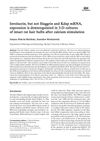TLDR Basonuclin helps keratinocytes multiply and prevents them from fully maturing.
The study found that basonuclin, a protein with zinc fingers and a nuclear localization signal, was primarily expressed in keratinocytes of stratified squamous epithelia and hair follicles, particularly in the basal layer. It was associated with the ability of keratinocytes to multiply and the absence of terminal differentiation. The presence of basonuclin was linked to maintaining proliferative capacity, as its disappearance correlated with the loss of colony-forming ability and the appearance of involucrin mRNA, indicative of terminal differentiation. In hair follicles, basonuclin was abundant in the outer root sheath, suggesting its role in regulating cell proliferation and differentiation.
64 citations
,
April 1992 in “Differentiation” Sciellin is a protein that helps form protective layers in skin, hair, and nails.
385 citations
,
November 1990 in “Journal of Cell Science” Human hair follicles can grow in a lab setting.
April 2019 in “The journal of investigative dermatology/Journal of investigative dermatology” A specific mutation in the TRPV3 gene causes hair follicle cells to develop improperly, leading to hair loss.
 3 citations
,
July 2011 in “Folia Histochemica et Cytobiologica”
3 citations
,
July 2011 in “Folia Histochemica et Cytobiologica” Calcium reduces involucrin in rat hair bulbs but doesn't affect filaggrin and Kdap.
9 citations
,
July 2008 in “Archives of Dermatological Research” 10 citations
,
October 2000 in “PubMed” E6/E7 oncogenes in hair follicles cause continuous hair growth by skipping the resting phase.
 94 citations
,
February 1994 in “The journal of investigative dermatology/Journal of investigative dermatology”
94 citations
,
February 1994 in “The journal of investigative dermatology/Journal of investigative dermatology” EGF makes hair follicles grow longer but stops hair production.
59 citations
,
August 1981 in “PubMed” Trichilemmal keratinization is a unique process in hair follicles where the outer root sheath turns into keratin without a specific layer.

